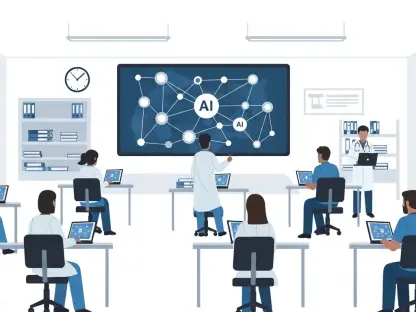The rapid advancement of artificial intelligence (AI) has revolutionized various industries, including healthcare marketing. The transformative power of AI lies in its ability to automate mundane tasks, analyze vast quantities of data, and personalize communications, all of which bring unprecedented efficiencies to the marketing landscape. However, the core question remains: Can AI ever truly replace the human touch crucial for genuine engagement in healthcare marketing? This article delves into the balance between AI’s capabilities and the irreplaceable elements of human interaction, exploring the strengths and limitations inherent in each.
The Rise of AI in Healthcare Marketing
AI has significantly transformed healthcare marketing by automating repetitive tasks and optimizing campaigns with impressive precision and speed. Advanced AI technologies have empowered marketers to generate vast amounts of content quickly, streamline complex data analysis, and personalize communication strategies based on sophisticated predictive analytics. By leveraging these capabilities, healthcare marketers can target their audience more effectively and efficiently than ever before.
Despite these advantages, the nuances and depth required to build meaningful relationships with healthcare professionals (HCPs) often elude AI-generated content. Research consistently indicates that a significant portion of consumers can identify content produced by AI, resulting in noticeably lower engagement levels. This insight underscores a critical limitation of AI—the inability to foster genuine connections as a result of its often impersonal nature. Whereas AI excels in scalability and consistency, it struggles to infuse the authenticity and emotional depth necessary for effective human communication.
The Limitations of AI in Building Trust
Trust is the cornerstone of healthcare marketing, and establishing credibility within this realm demands more than impeccable data analysis and efficient workflows. HCPs, in particular, rely heavily on peer-to-peer interactions for validating knowledge and making informed decisions. Authentic exchanges within trusted communities offer secure environments for professional growth, an area where AI falters.
AI-generated content, while convenient and efficient, often feels impersonal and disconnected. This lack of emotional resonance can alienate HCP audiences who place a high value on empathy and nuanced understanding in their interactions. Studies have shown that HCPs tend to trust closed professional communities more than open-source content, which highlights the importance of prioritizing human-centric engagement. The limitations of AI become particularly prominent when trying to replicate the authenticity that naturally occurs during human interactions, making it clear that trust and credibility are cultivated best through genuine human engagement.
The Importance of Human-Centric Interactions
Human interactions play a crucial role in building trust and credibility in the healthcare marketing sector. Peer-to-peer exchanges are indispensable for validating knowledge, facilitating critical decisions, and fostering professional growth among healthcare professionals. These meaningful interactions are essential for nurturing deep and lasting relationships, which are the bedrock of effective healthcare marketing strategies.
Platforms like G-Med exemplify the synergy between human engagement and AI development by facilitating global collaboration among physicians. This interaction enriches data ecosystems, which in turn drives AI innovation. The reciprocal relationship between human-centric interactions and AI highlights the necessity of fostering authentic connections. Human interactions not only help to build trust but also generate valuable data for AI systems to evolve and improve, thereby enhancing their overall effectiveness.
Balancing AI with Human Oversight
The optimal integration of AI and human engagement should be seen as complementary rather than competitive. AI is ideally positioned to handle routine tasks and data analysis, freeing up time for healthcare marketers to focus on building genuine human connections. However, human oversight remains indispensable to ensure that AI-generated content aligns with a brand’s voice, values, and quality standards.
Transparent communication regarding AI’s role in content creation is essential for building and maintaining trust. Recognizing AI as a powerful tool rather than a replacement for human creativity is critical to preserving authenticity in healthcare marketing. Actively seeking and incorporating feedback from HCPs further ensures that the content remains relevant, genuine, and reflective of the audience’s needs and preferences. This balance between leveraging AI for efficiency and upholding human-centric strategies is foundational for effective and impactful healthcare marketing.
The Role of Emotional Connection in Healthcare Marketing
Emotional engagement and empathy are essential components of successful healthcare marketing. AI, despite its many advantages, often misses these critical nuances, making genuine human interactions indispensable. The ability to convey empathy and understanding effectively through human interactions cannot be replicated by AI, which frequently produces content that feels detached and impersonal.
Studies consistently emphasize that HCPs trust closed professional communities more than open-source content, underscoring the need for authentic engagements to create lasting, meaningful relationships. This distinction points to the challenge faced by healthcare marketers: leveraging AI for its efficiency and data-driven insights while prioritizing human-centric strategies to build deeper connections with their audience. Genuine human interaction remains the linchpin for establishing trust, fostering collaboration, and ensuring the highest standards of professional development.
The Future of AI and Human Engagement in Healthcare Marketing
The rapid advancement of artificial intelligence (AI) has significantly transformed various sectors, including healthcare marketing. AI’s enormous potential lies in its capacity to automate repetitive tasks, scrutinize large datasets, and customize communications. These features collectively introduce unprecedented efficiencies to the marketing field. Nevertheless, a fundamental question persists: Can AI ever fully substitute the human touch that is essential for authentic engagement in healthcare marketing? This piece examines the equilibrium between AI’s capabilities and the unique elements of human interaction. It investigates how AI and human input in healthcare marketing can complement each other, highlighting the impressive strengths AI brings and acknowledging the irreplaceable value of human empathy and intuition. By delving into the advantages and drawbacks of both AI and human roles, the article aims to shed light on their interplay and the future of marketing in the healthcare industry.









